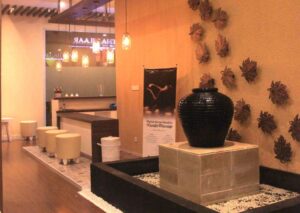In the rapidly evolving landscape of urban healthcare, the integration of technology into wellness initiatives has become a focal point for cities worldwide. This burgeoning trend is epitomized by the concept of ‘Smart Health Smart Relaxation’ epitomized in the innovative program, Rumah Sehat E-Health, located in West Jakarta. As metropolitan areas grapple with the multifaceted challenges of public health, the utilization of digital solutions seems not merely advantageous but essential. This article elucidates the underlying principles and benefits of Rumah Sehat E-Health, illustrating how this initiative encapsulates the duality of health and relaxation—a symbiotic relationship increasingly recognized in contemporary health discourse.
Firstly, it is indispensable to explore the core premise of Rumah Sehat E-Health. At its essence, the initiative marries the provision of essential health services with user-friendly digital platforms, allowing residents of West Jakarta to access medical information and wellness resources effortlessly. Such a paradigm shift aims to address the burgeoning healthcare demands faced by urban populations, where conventional methods often falter under the pressures of time constraints and accessibility issues.
Moreover, the fascination with smart health solutions can be attributed to their capability to personalize healthcare experiences. Through meticulous data analysis and a user-centric design, platforms championed by Rumah Sehat E-Health are adept at tailoring health recommendations to individual user profiles. This bespoke approach fosters a sense of agency among users, as they are empowered not merely as passive recipients of care, but as active participants in their health narratives.
Transitioning toward the dimensions of relaxation, it is pertinent to note that mental well-being is integrally linked to physical health. The pressures of urban living—often characterized by noise pollution, overcrowding, and relentless activity—catalyze heightened stress levels. Thus, Rumah Sehat E-Health emerges as not only a vendor of medical assistance but also as a purveyor of relaxation techniques and mental health resources. The platform provides access to guided meditations, stress management strategies, and wellness workshops aimed at fostering a holistic approach to health that transcends mere symptom management.
Engagement with such resources can have profound implications. Scientific studies underscore the correlation between relaxation techniques and improved health outcomes; reducing stress can yield significant benefits, ranging from improved cardiovascular health to enhanced immune function. Thus, the integration of relaxation methodologies into the health framework offered by Rumah Sehat E-Health invites users to contemplate their well-being from a more nuanced perspective.
Furthermore, the communal aspect of health and wellness emphasizes the importance of social connections in mitigating isolation, a common ailment in urban settings. Rumah Sehat E-Health facilitates community building through online forums and support groups, where individuals can share experiences and provide encouragement in a digital milieu. This encouraging atmosphere not only promotes socialization but also fosters a sense of belonging—key elements that contribute to overall psychological health.
Addressing technological accessibility, it is critical to discuss the role of digital literacy among residents, particularly in a city as populous and diverse as Jakarta. For the effectiveness of Rumah Sehat E-Health to be realized, efforts to bridge the digital divide must be prioritized. Educational initiatives aimed at enhancing digital competencies will equip residents with the necessary skills to maximize the advantages of e-health solutions. Through dedicated outreach and support, the program can ensure that no demographic is left behind, thereby realizing the potential for widespread health literacy and empowerment.
The further implications of integrating a technological approach to health in urban environments transcend mere convenience; they call into question the traditional healthcare framework. Indeed, the conventional medical model often operates in a reactive capacity, addressing maladies post facto rather than proactively. Conversely, the ethos of Rumah Sehat E-Health advocates for preemptive healthcare, utilizing analytics and monitoring tools to identify potential health issues before they escalate. This shift not only enhances individual health outcomes but also alleviates strain on public health systems, which are often overburdened in densely populated areas.
In this context, the role of innovative technology in enhancing the efficacy of health services cannot be understated. The integration of artificial intelligence, telemedicine, and health apps has the potential to revolutionize patient-provider dynamics, facilitating real-time consultations and follow-up care. These advancements, while offering tremendous potential, also beckon critical discussions regarding data privacy and ethical considerations, as they navigate through sensitive personal health information.
In conclusion, the interplay between smart health initiatives and the relaxation quotient exemplified by Rumah Sehat E-Health possesses profound significance in the urban health narrative of West Jakarta. It encapsulates a modern understanding of health as a holistic construct, intertwining physical, mental, and social well-being. As we move towards an era where technology seamlessly integrates into our daily lives, the commitment to fostering a culture of health, relaxation, and community within the urban landscape is not merely a futuristic vision but an attainable reality. Through such initiatives, cities can aspire to create healthier, more resilient populations, capable of thriving amidst the complexities of modern urban existence.



Leave a Comment